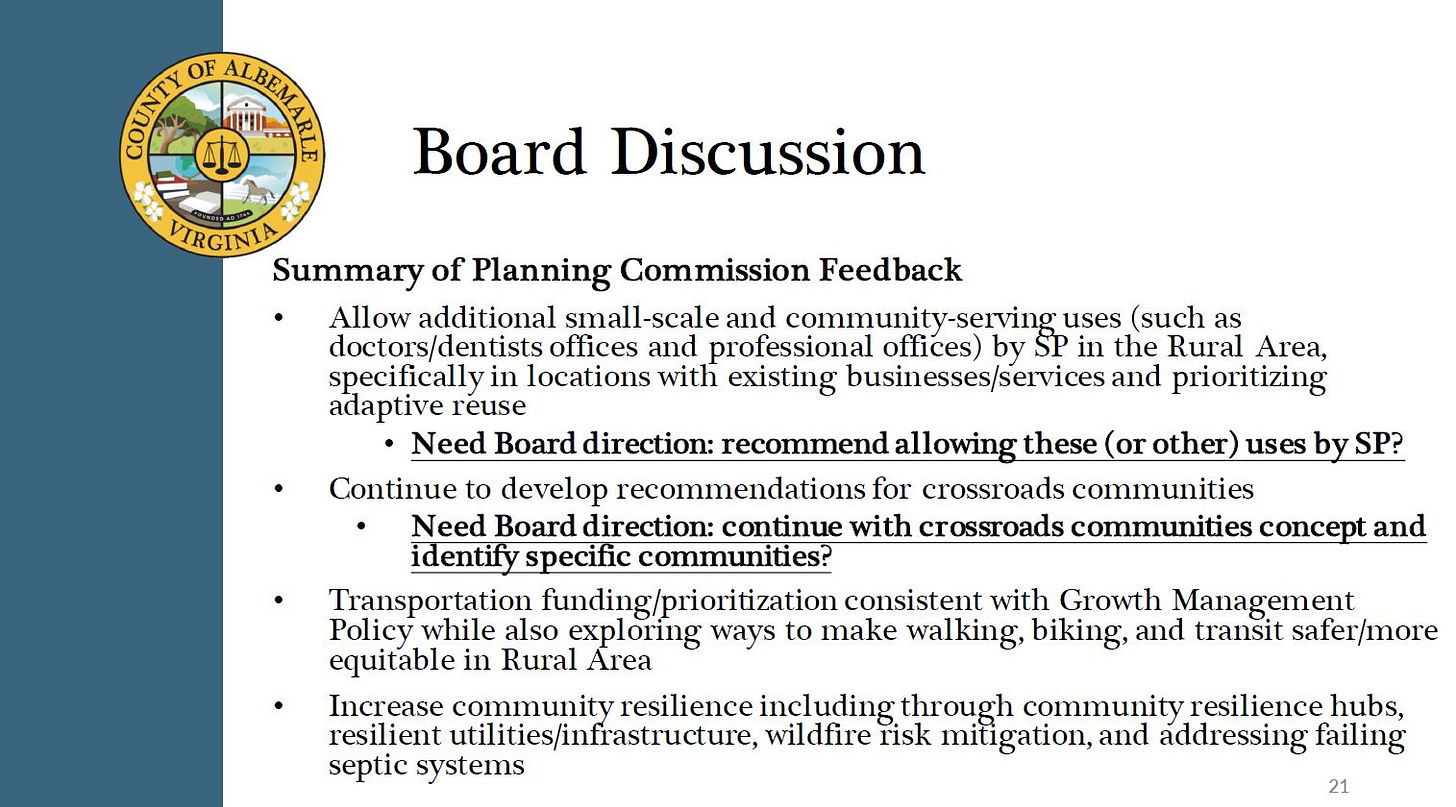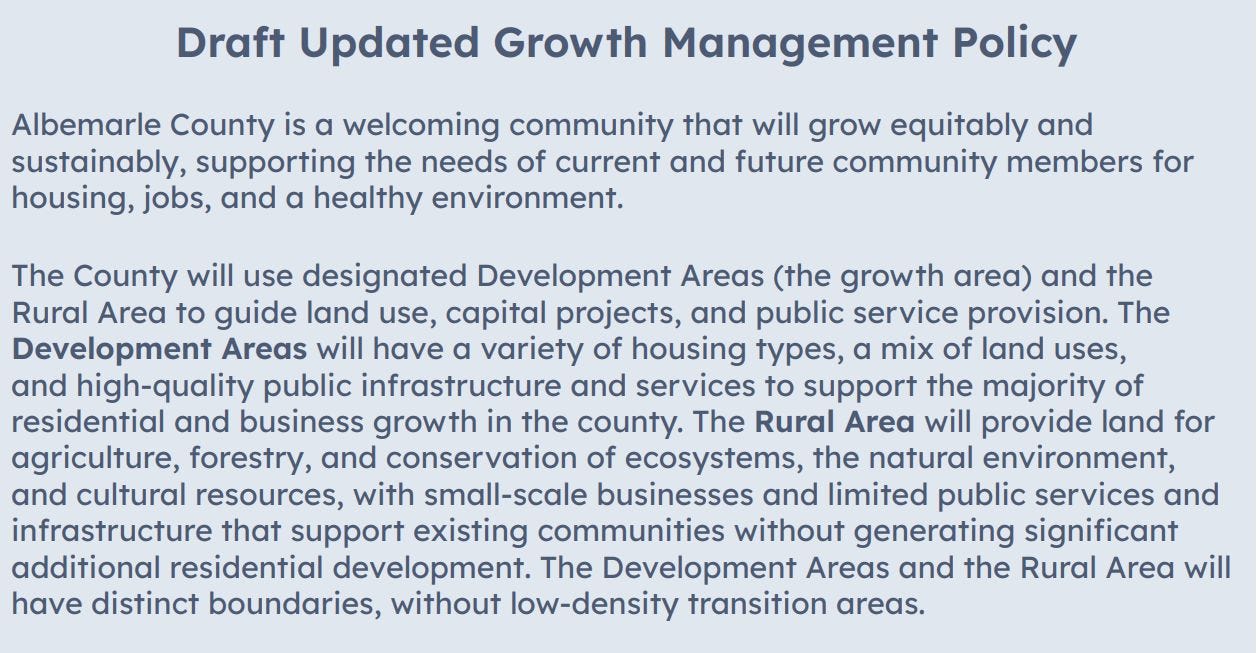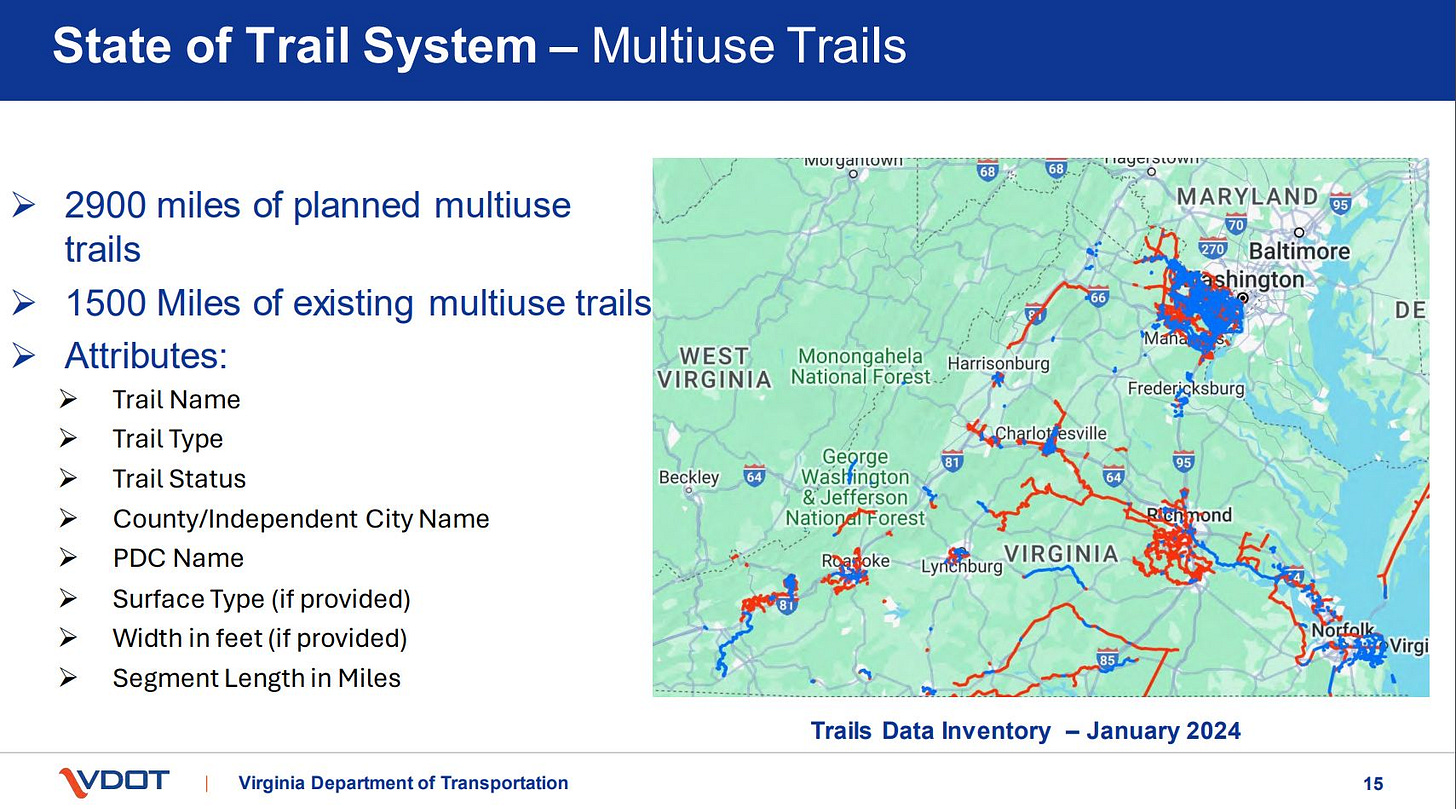April 15, 2024: Homicide suspect turns himself in to Charlottesville police; Alternative school closes for day after student brings gun to class
Plus: Albemarle Supervisors weigh in on expanded uses in the rural area as part of AC44 process
The third Monday of the month also coincides with the deadline to file federal taxes or request an extension. April 15, 2024 is also the day that this particular edition of Charlottesville Community Engagement comes out with information on several stories related to public safety, public school, public transportation, and public benefits in the rural area. I’m Sean Tubbs, and I think I have my paperwork in order
In today’s installment:
A man wanted for the city’s first murder of the year has turned himself in to Charlottesville Police
An alternative academy for middle schools shuts down for the day after a gun is found
A closed-door body gets updates on rails and trails across the Commonwealth
A locally produced podcast on the Black sewing community wins a national award
Albemarle Supervisors weigh in on expanded uses in the rural area as part of the Comprehensive Plan process
First shout-out: WTJU Rock Marathon - April 15 through April 21
In today’s first Patreon-fueled shout-out: The WTJU Rock Marathon has begun! I speak with personal experience that one of the most exciting weeks to own a radio is when you can tune in to 91.1 FM or wtju.net to pick up a harmony of sounds!
Vibrant tunes will unfold across the airwaves like spring blooms, bringing you a diverse array of textures and tones. Rock adjacent sounds and styles are included, bringing a kaleidoscopic week of terrific music that speaks to all tastes. There will also be two live concerts on the WTJU Stage, local bands Ostinato on April 19, and New Boss on April 20.
Now’s the time to check out the schedule and find the time you’ll make an appointment to tune in and experience the best week of radio anywhere! And if you want to go ahead and get your donation to WTJU in as well, I’m sure they would not mind.
Murder suspect turns himself in
The suspect wanted in connection with last week’s murder of 31-year-old man Deqwane Brown has turned himself in. Sidney Montecellus Stinnie of Charlottesville reported to the city’s police department this morning four days after several arrest warrants were issued in connection with the homicide.
Stinnie is being held at the Albemarle-Charlottesville Regional Jail and charged with second degree homicide, using a firearm in commission of a felony, and possession of a firearm by a convicted felon.
An information release states that Stinnie is presumed innocent until proven guilty and that that investigation of Brown’s murder on April 9 continues. He was gunned down while sitting in a parked vehicle according to initial reports.
Alternative middle school closed for day after gun found
A student of the New Pathways program is in custody today after bringing a loaded firearm to classes held at the Boys & Girls Club near Buford Middle School.
“The gun was spotted near the bag of a student who was sleeping in class,” wrote Amanda Korman, community relations liaison for Charlottesville City Schools. “Staff and the two other students were able to exit the room.”
New Pathways is an alternative education program for seventh and eighth graders who need additional assistance. Buford Middle School briefly went into “indoor instruction” while Charlottesville Police responded.
“At Buford, all students remained on their normal schedules (while indoors) during this time period since the incident was resolved before classes changed at 1:49 p.m.,” Korman said in an email sent to parents.
While instruction continued at Buford, the Boys & Girls Club canceled all afternoon activities.
Closed-door group of planners gets update on rails and trails
Every month, top officials in the planning departments in Albemarle County, the City of Charlottesville, and the University of Virginia get together for a briefing of various issues related to the built environment. Meetings of the Land Use, Environmental and Planning Committee are closed to the public but minutes are posted after the fact.
On March 15, the group had briefings from the Department of Rail and Public Transportation, the Virginia Passenger Rail Authority, and the Virginia Department of Transportation’s State Trails Office. (view the minutes)
The DRPT’s presentation featured updates on efforts to increase rail travel through Virginia. In December, four corridors were chosen for future grants from the Federal Railroad Administration. These included development of new service between D.C. and Charlotte, North Carolina as well as a new east-west service called the Commonwealth Corridor.
“The development of this corridor would connect Virginia's two existing passenger rail corridors,” reads page 11 of the presentation.
There will also be requests for increased frequency on the Cardinal line between New York and Chicago and extension of the Northeast Regional service to Bristol.
“Further extending service to Bristol would increase transportation equity and geographic diversity of rail service in Virginia by increasing transportation mode choice in previously unserved, predominantly rural areas,” reads page 13.
Budgets and detailed schedules will be developed for each corridor project this summer. Don’t plan a trip just yet. Service development plans are to be developed in 2026.

The Virginia Passenger Rail Authority is the DRPT’s partner in planning efforts. The agency was created in 2020 to help manage a $3.7 billion investment in railway infrastructure.
“In 2023, Virginia’s state supported service set an all-time ridership record with 1,325,931 passengers, exceeding the previous high of 1,021,452 riders set in 2022,” reads page 5 of the VPRA’s presentation.
Since VPRA purchased a 164.2 mile rail corridor between Doswell and Clifton Forge, many have asked whether the public agency would be more amenable to allowing recreational trails than CSX. However, page 11 of the presentation indicates there are restrictive covenants that prohibit such activity and negotiations would have to take place through a process initiated by legislation adopted by the General Assembly in 2009.
“Proponents of trails must work with DCR through the HB2088 process, and then obtain the approval of CSX (grantee) followed by VPRA and BBRR (railroad operator),” reads the presentation.
How did that sit with the attendees of the meeting? The minutes do not capture any of what was discussed per an updated LUEPC Charter that discourages participants from sharing information.
The group also got an update from the Virginia Department of Transportation’s State Trails Office. (view the presentation)
The LUEPC next meets on April 19 at noon for a virtual meeting. What will they talk about? We’re not told until ten days after the fact.
Local podcaster wins award for Stitch Please
An organization that promotes the work of audio professionals has honored a local podcast with a top award for 2024. The Podcast Adademy has named Stitch Please its Best DIY Podcast at a ceremony in Los Angeles in late March.
“The Ambies celebrate excellence in podcasting and elevate awareness and status of podcasts as a unique and personal medium for entertainment, information, storytelling and expression,” reads a press release announcing the winners.
Stitch Please is the podcast for Black Women Stitch, created by Lisa Woolfork of Charlottesville. She began the campaign after August 12, 2017 to write about the Black experience in sewing after feeling ostracized in traditional groups. Black Women Stitch has the tagline of “the sewing community where Black lives matter.”
“After harrowing experiences with racist terror attacks in Charlottesville, Virginia, I decided to build a Black feminist liberation space of care that celebrates the creative lives of Black women, girls, and femmes,” Woolfork writes on her website.
The show comes out every Wednesday and features sewing tips, history, and interviews with Black quilters, designers, and fiber artists. Previous guests have included Bisa Butler, sustainability activist Aja Barber, and US Poet Laureate Rita Dove. Woolfork is assisted with editing support from Podcast Laundry.
Woolfork’s award of Best DIY Podcast is one of 27 AMBIES. Podcast of the Year went to Slate Magazine with Slow Burn: Becoming Justice Thomas. There’s a full list of winners at this press release.
Second-shout out: JMRL’s Community Read
In today’s second subscriber supported public service announcement: Every year, the Jefferson Madison Regional Library selects a book for the entire community to read and this year the library has partnered with Albemarle County and Charlottesville for a special panel on April 21 at the JMRL Central Branch.
The book is All We Can Save: Truth, Courage, and Solutions for the Climate Crisis and it is an anthology of 60 women who are working to help lessen the effects of changing weather patterns.
All We Can Save highlights an intersection between the historically significant contributions women have made to improvements in our society and environment. The essays also address the importance of climate resilience and the awareness of climate impacts over time. Copies of the book will be available to pick up for free at these locations:
All Jefferson-Madison Regional Library (JMRL) Branch locations
Albemarle County Little Free Library (LFL) locations
City of Charlottesville LFL locations
The panel discussion will be held from 1 p.m. to 3 p.m. at the JMRL Central Branch. RSVP here if you’d like to attend.
Supervisors weigh in on rural area objectives in Albemarle AC44 work session
Albemarle County is 280 years old and will celebrate a tricentennial in 2044. That year is also what planners are targeting as work continues on an update of the Comprehensive Plan.
One item on a long list of stories I want to step up coverage on is the update of the plan. Let’s go back in time now to March 20, 2024 when the Board of Supervisors held the first of two work sessions on the AC44 process. That’s the name for the Comprehensive Plan update. Tori Kanellopoulos is a principal planner in the county’s Department of Community Development. (view materials for the March 20, 2024 presentation)
“There are eight plan chapters, each of which have goals, objectives, and actions,” Kanellopoulos said. “Goals are where we want to go. Objectives are outcomes or targets to help us get there. And the actions are the steps to make the plan happen.”
The Comprehensive Plan is being updated in a five-phase process and planners are at the end of phase 2 which is to create the new goals and objectives. Phase 3 will see the creation of the action steps followed by prioritization as well as the development of metrics intended to gauge progress.
A big question that undergirds the whole discussion is whether Albemarle has enough room in its current development area to support anticipated population growth. The Weldon Cooper Center for Public Service at the University of Virginia projects the number of people who live in Albemarle will increase from the 2023 estimate of 115,676 individuals to 124,016 in 2030, 138,523 in 2040, and 155,102 by 2050.
Since 1980, the Comprehensive Plan has divided Albemarle into one of two land use categories. There’s a development area of roughly five percent of the county’s 726 square miles, and a rural area where county rules are strict about what can be built and what uses can occur.
“Efficient use of development area land is a topic we’ll be asking for the Board’s direction on today,” Kanellopoulos said. “We’ve also heard that for the rural area we should explore opportunities for small-scale and community serving uses and services and opportunities for community resilience hubs.”

Those hubs would be intended to be gathering and distribution points in case of a disaster.
The county is also looking to review whether more uses should be allowed at the Shadwell and Yancey Mills interchanges on Interstate 64. Kanellopoulos said this would take the form of a small-area plans. She also shared some of the current feedback on priorities for the rural area.
“Many of these priorities are consistent with the current Comprehensive Plan with an overall emphasis on protecting the natural environment and having usable land for agriculture and forestry in the rural area,” Kanellopoulos said. “Implementation would be done primarily through future small area planning efforts for those areas.”
Kanellopoulos said about 45 percent of Albemarle residents live in the rural area. Should there be more services in those areas like medical offices? As a way to head into that direction, there is a draft goal 4.
“Albemarle County will proactively plan for unique locations in the Rural Area with established land-use patterns, zoning, and existing development that are inconsistent with Rural Area goals, including locations where development has already occurred that does not conform with Rural Area goals, locations with zoning other than Rural Area that are adjacent to the Development Areas, and the rural interstate interchanges.”
“Implementation would be primarily be done through future small area planning efforts for those areas,” Kanellopoulos said.
One new objective would be to create a new “rural area land use plan” that would try to get move away from a “one-size fits all” approach for those properties.
Supervisor Diantha McKeel’s Jack Jouett District is the least rural of the six political subdivisions. She said she supported small-scale commercial uses outside of the rural area and supported small area plans for areas designated as “Crossroad Communities.”
“I am in favor of them in theory but the devil is always in the details, right?” McKeel said.
McKeel also noted that there has been initial feedback regarding adding bike and pedestrian facilities on rural roads.
“I’m just not sure exactly how that would play out realistically with our limited financial resources,” McKeel said. “Realistically, we are struggling in the development area for transportation alternatives.”
Kanellopoulos said improvements would not necessarily be large scale but could involve wider shoulders or could be building specific trails.
McKeel was also skeptical about large expansions of transit into the rural area but suggested that is further work that the proposed Regional Transit Authority might undertake.
“There is no way we can afford to put a robust transit system in 726 square miles,” McKeel said.
Supervisor Ned Gallaway of the Rio District agreed with McKeel that spending money on multimodal transportation in the rural area was a non-starter.
“We’re not putting walking, biking and transit infrastructure in the rural area,” Gallaway said. “So I’m not going to be supportive of that.”
“There’s no way,” said Supervisor Ann Mallek
“There’s no way, McKeel chimed in again.
Gallaway also supported Crossroad Communities but favored leaving up the direction for each of them to the people who live around them. He did support the Albemarle’s development of community resilience hubs in the rural areas.
“I feel like we should somehow provide places for folks to go when power is out especially during either extreme heat or extreme cold times,” Gallaway said. “Whether or not those have to be in the Crossroad Communities, I don’t know, but the county definitely has a responsibility to provide that.”
One of the questions to Supervisors was whether they would support allowing more uses in the rural area if they were controlled by a special use permit. Gallaway said he would be open to the idea. Supervisor Ann Mallek suggested there be clear guidelines.
“It depends because a large fuel station and convenience center is different than an artisan furniture maker as far as its impact,” Mallek said.
Mallek said Earlysville may not be considered a Crossroad Community but it is a village with more than just homes. But she said many businesses that may be desired by planners may not be viable.
“Five churches, a post office, a doctor’s office which went out of business due to lack of interest,” Mallek said. “Two auto repair shops. A thrift store. Its grocery store went out of business when the bridge at Advance Mills was closed and all of the Greene County people had to find another way and then Harris Teeter opened in Hollymead and that was the end of the grocery store.”
Mallek said people who live in the country do not expect to have many businesses close by and the whole point of the Comprehensive Plan is to allocate Albemarle’s resources to areas where there is infrastructure.
“I would hope that our Comprehensive Plan would not be making promises about all sorts of different things that have very little chance of ever coming true,” Mallek said.
Mallek also suggested language that any community resiliency hubs would be in existing structures rather than in new buildings.
Mallek also had a suggestion that Albemarle consider creating an agricultural zoning district, something she said hasn’t existed since 1980 when the county downzoned to reflect Comprehensive Plan, creating the Rural Area zoning category that became a one-size-fits-all approach for the overwhelming majority of Albemarle’s 726 square miles.
“And what that meant is that it became a residential almost de facto despite tremendous protest from people in the rural area that said the first use, the primary use should be agriculture and forestry and not ag and forestry and residential and little commercial uses or whatever,” Mallek said.
Mallek also warned about putting anything in the Comprehensive Plan that would take away resources from the development area such as traffic calming efforts.
“We have a terrible time accomplishing such things,” Mallek said.
Supervisor Mike Pruitt of the Scottsville District said he liked the direction the Comprehensive Plan is heading with regard to the rural area.
“I think it’s important that we think of the rural area as a place with real texture, right?” Pruitt said. “There’s a place with a diversity of actual uses, a diversity of living, and actual diverse economic activity that goes on there.”
Pruitt said efforts to preserve land benefit private individuals more than the rest of the public. He said the Comprehensive Plan should focus on placemaking in the rural area to allow more people to enjoy it.
“A place in the rural area as someone who does not currently live in the rural area that I frequently visit and enjoy is the Dick Woods Road Miller School parking area,” Pruitt said. “It’s a very popular cross country track.”
To Pruitt, placemaking would involve making sure it is safe to access such areas. He also said he would support small-scale restaurants in crossroad communities to create spaces for people and their families to go.
Pruitt also said the best way for landowners to make money off rural land now is through luxury housing, something he said should be discouraged by allowing pockets of smaller footprint structures.
“Is there a way to legalize and make by-right more affordable units and more affordable design types and patterns of living in the [rural] area?” Pruitt asked.
Pruitt said he understands such a policy would have to be done in a way to discourage sprawl and that the county should look and see what similar communities are doing across the country.
More from the AC44 process in the near future as I go through various meetings. Also discussed at the March 20 meeting is land use and transportation in the development areas.
The Community Facilities chapter was discussed on April 3 which includes the county’s growth management policy.

Reading material:
ACPS school to change its name, Garrett Whitton, CBS19 News, April 8, 2024
Albemarle supervisors suggest additions to $629M proposed budget, Jason Armesto, Charlottesville Daily Progress (paywall), April 11, 2024
An Ode to the Northeast Corridor, the Rail Line That Keeps Amtrak Alive, David Zipper, April 12, 2024
County hires new zoning administrator, Gracie Hart, Madison Eagle (by way of Charlottesville Daily Progress), April 11, 2024
Tree Planting Honors Nancy Takahashi on Founder’s Day, Matt Kelly, UVA Today, April 12, 2024
UVA, Monticello Honor Three for Efforts in Citizenship, Architecture and Law, Bryan McKenzie, UVA Today, April 12, 2024
City increases funding for anti-gun violence organization, CBS19, April 12, 2024
#663 will now fly off into the sunset
The idea was that this one would in fact be a podcast as well, but last week the microphone I’ve used since the beginning broke. I also have not come up with a replacement for the computer that’s no longer reliable. At 3:45 p.m. I finished the writing and then calculated it would likely take two hours to get out the audio.
So the podcast break continues as I try to reorganize and regroup. I will likely produce one podcast this week of longer segments that use audio from meetings. Four out of five segments today did not meet that threshold so out the door the print version goes.
I do know I’m likely letting a few people down by not figuring out a way to get the podcast done concurrently, but at some point I have to realize my limitations and make decisions. I’m in this position because of the hundreds of you that are supporting the work financially. I really appreciate your efforts because they keep me going.
I’m also appreciative of the sponsorship from Ting. Ting will match your initial subscription should you decide to take the plunge.
Ting can help you with your high speed Internet needs. If service is available in your area and you sign up for service, enter the promo code COMMUNITY and you will get:
Free installation
A second month for free
A $75 gift card to the Downtown Mall








